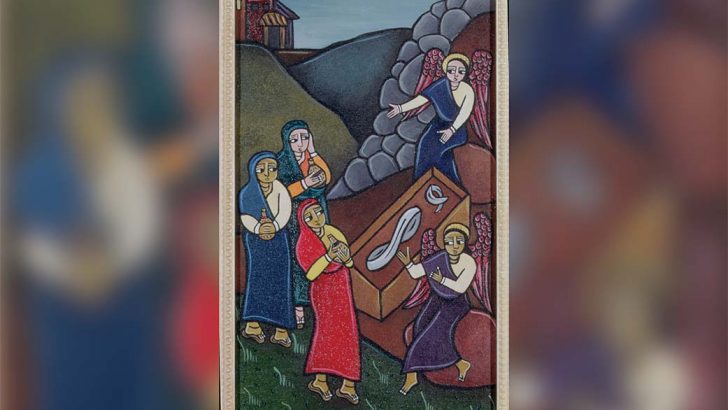Notebook
A ‘pregnant pause’ is supposed to be one of the best tools in the armoury of a public speaker. In my 37 years of preaching, I have used it on only one occasion — on an Easter Sunday morning. It was amazingly effective.
Easter Sunday is a hard day for the preacher. In Holy Week, up to four other homilies have to be prepared. Priests in one-priest parishes — most of us now — know the routine. First there’s Palm Sunday, for which a short homily is suggested in the Missal. This of course requires a lot more preparation than a long one; anyone can talk all day, but making a valuable point briefly requires effort.
After Palm Sunday comes the Triduum, which requires at least a homily a day; for Holy Thursday, Good Friday and the Vigil. Some might use the same homily at Vigil and morning Masses, but those two celebrations feel very different.
Trouble
The trouble is that Easter Sunday requires an interesting few words, even better than normal. The (pre-pandemic) audience was often considerable, with people who hadn’t been seen since Christmas usually making an appearance. And these, no less than those who are at every ceremony, deserved to be nourished, no matter how un-enthusiastic the homilist might feel.
Preachers in the diocese to which I am attached (Cork and Ross) have one slight advantage to counter those downsides. The wise pastors who preceded us insisted that the Easter Sunday collection went to the priest, not just the Easter offerings envelopes. This does add a slightly unworthy incentive to the priest to make that little bit of extra effort, knowing that the people whose envelope lies safely on the mantelpiece at home might still be encouraged to impetuously show Easter generosity to the poor exhausted preacher.
Easter Sunday
Which brings me to the pregnant pause, and my effective use thereof. That Easter Sunday, I spoke of my experience of visiting graves. One classmate of mine died in a February, so on the following Easter Sunday I visited his grave and found it signalling Easter hope. Not only was it bedecked with flowers, but a butterfly fluttered nearby, to banish all doubts.
My mother also died in the early part of the year. The following Easter Sunday I visited her grave, expecting a similar experience. But instead (pregnant pause), I felt (another pregnant pause) NOTHING. Gasps were heard. Had I lost faith? Was a dispiriting confession of agnosticism about to be made? A long pregnant pause followed, during which, I was told afterwards, many people never heard the church so silent.
The words that came to me at her graveside were from that morning’s Gospel: “Why search among the dead for someone who is alive?…She is not here, she has risen.”
That’s our Easter faith in a nutshell. If it’s true for Jesus, it’s the same for all, for you and me too. When you visit the grave of someone you love this Easter, remember it. And have a Happy Easter!
The power of the passed
I wrote about my great grand-uncle here last time; he was parish priest where I now serve, many years ago. One of his successors “took the feet off him”, as the people here say. This successor was a great fan of straight graveyard paths, and wasn’t best pleased that old Fr Bernard’s grave protruded. So he decided that radical action was required, and re-directed the path over the end of the dead priest’s grave. It didn’t go down well, so, sheepishly, the feet had to be restored. And he learned that dead priests sometimes have more power than live ones…\
***
I’m grateful to the readers who contacted me who share my unease with the ‘Act of Spiritual Communion’, now often included in Masses. From Rome came words of approval also, and the reminder that Holy Communion is of its very nature spiritual, “signs of invisible grace” being the phrase used. I was also informed that Dominicans with good theology would say that St Thomas would object to the actual prayer often used. Whether it’s St Thomas Aquinas or Thomas the Apostle, I don’t know and didn’t ask — I didn’t want to push my luck. A word of affirmation is always welcome!


 The Resurrection is depicted in a painting by Laura James
The Resurrection is depicted in a painting by Laura James 